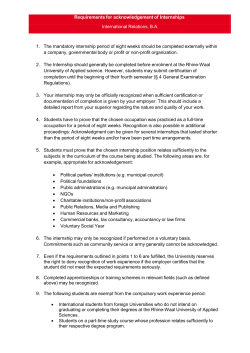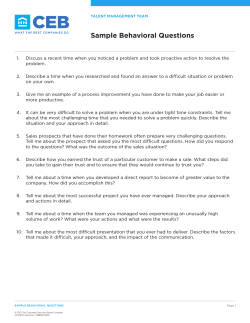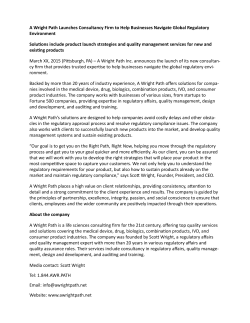
Key components of Emotional Intelligence
Morehouse School of Medicine Department of Psychiatry & Behavioral Sciences HBCU - Center for Excellence in Behavioral Health Building your Professional and Personal Brand Through Internships: While Earning College Credits Thursday, April 30th - 2pm-3pm EDT Presented by Dr. Darrin E. Wright, Assistant Professor and Director of Field Education, Clark Atlanta University in the Whitney M. Young, Jr., School of Social Work Grant # TI-025590 Historically Black Colleges and Universities Center For Excellence In Behavioral Health Cooperative Agreement with the Substance Abuse and Mental Health Services Administration’s (SAMHSA) Center for Substance Abuse Treatment (CSAT) and Center for Mental Health Services (CMHS). SAMHSA Grant No: TI 025590: HBCU-CFE 2014-2017 Promote student behavioral health to positively impact student success and retention Expand campus service capacity, including the provision of culturally appropriate behavioral health resources Facilitate best practices dissemination Foster behavioral health workforce development through internship opportunities at behavioral health sites Dr. Darrin E. Wright Dr. Wright is an Assistant Professor and Director of Field Education, at Clark Atlanta University in the Whitney M. Young, Jr., School of Social Work; Dr. Wright has served in his current position as Director of Field education for the past 9 years. Dr. Wright has over a decade of community based social work practice in the area of mental health and addictions with individuals, families and communities; which included Social Services Division Coordinator for Behavioral Health and Developmental Disabilities at Central State Behavioral Health Hospital, in Milledgeville, Georgia, prior to assuming his appointment at CAU in 2006. Dr. Wright holds a B.A. in Forensic Psychology from John Jay College of Criminal Justice, Manhattan, NY; a Master’s in Social Work from Columbia University, Manhattan, N.Y. and a PhD in Social Work Policy, Planning and Administration from Clark Atlanta University. Dr. Wright’s area of expertise and interest are: integrated behavioral healthcare systems, community development, international social work, and workforce development for individuals with disabilities. Building Your Personal and Professional Brand Through Internships : While Earning College Credit. Presenter: Dr. Darrin E. Wright, LMSW Assistant Professor/Director of Field Education Clark Atlanta University, School of Social Work April 30, 2015 There are three elements important to successful people who want to excel in their craft and move up in their profession. They must: • Perform exceptionally well. • Cultivate proper Image. • Manage their Exposure so the right people will know them. 60% 30% Exposure Image 10% Performance Did you know • Organizations pay for performance but tend to promote based on potential PIE – A FORMULA FOR SUCCESS Performance • Entry ticket • Reputation builder • Starts the legacy… Your legacy • Common denominator in the promotion process • Confirms your ability to take on more responsibility • Must grow to stay above the bar as It is continuously being raised Performance is Key Make a difference on every job and perform each with the goals of the organization in mind Develop a reputation for delivering results Take the hard job…err on the side of the bigger challenge Do everything with a sense of urgency and a drive to win Make each decision in the best interest of the business Take risks, present new ideas but always relate them directly to current business needs Always with unyielding Integrity PIE – A FORMULA FOR SUCCESS Performance Image • Entry ticket • Reputation builder • Starts the legacy… Your legacy • Common denominator in the promotion process • Confirms your ability to take on more responsibility • Must grow to stay above the bar as It is continuously being raised • It’s the message you send before you speak, whether intentional or not • Includes attire, confidence and demeanor • Develops early in your career • Says “I’m Ready” • Every interaction counts. Make sure all are positive Image = Brand If you are not sure if your image is consistent with your career goals, ask for guidance. The only way to see yourself as others see you is to ask others for an honest assessment of what they see If your goal is leadership, it is helpful to take a measure of your image and compare it with the image of other successful leaders in the business You can change your image if you are open to self-improvement. Your Brand is the Story when it all comes together Personal Branding = Image You are a total package Character Education and knowledge Experiences with other jobs, countries and cultures Competencies and successes Values, Morals, Passions Your brand encompasses your image, your reputation and the extent of your exposure. Why Are These Brands So Good? They are recognizable with established standards of excellence No one knows their product features any better They are constantly improving their product They position & market their products for critical exposure They plan for a great return on their investment Managing Your Brand How often do you assess yourself? Do you know your Brand? What are your skills & skill gaps? What experiences have you had and how have they shaped you? What are your beliefs and values? Are your values consistent with your Company Values? What is your definition of success? Is your image consistent with your definition of “you”? PIE – A FORMULA FOR SUCCESS Performance Image Exposure • Entry ticket • Reputation builder • Starts the legacy… Your legacy • Common denominator in the promotion process • Confirms your ability to take on more responsibility • Must grow to stay above the bar as It is continuously being raised • It’s the message you send before you speak, whether intentional or not • Includes attire, confidence and demeanor • Develops early in your career • Says “I’m Ready” • Every interaction counts. Make sure all are positive • High career impact • How others know of your performance • Makes you visible to those who can influence your career • Can be enhanced by network of mentors, bosses & champions • People love it, but can be good or bad Exposure Often you will have to make the first move Get to know others on a personal level when it is comfortable Listen when others tell you about themselves Develop a reputation for knowing what you are doing Broadcast successes – people can’t read into your minds! Be willing to lend a helping hand Ask for project work, task forces, stretches But remember, exposure means you’re exposed! Networking Requires Work Successful networking requires the productive use of time and resources Continually update your contacts. Keep in touch through lunch, phone calls and messages, emails, personal notes Networking is reciprocal. Find ways to give back to those who devote time and energy to you. Getting the Internship 1. Contact your Internship Coordinator. 2. Contact your Student Career Planning & Placement Center( CPPC). 3. Research/Contact United Way-211 Directory. 4. Search Internship websites, such as: Internships.com Idealist.org Experience.com 5. Reach out to your networks Benefits of paid vs. unpaid internships Paid Unpaid 1. 2. 3. 4. 5. 6. 7. Internships serve as an opportunity to apply classroom theory to real world practice. Decide if this field is right for you. Gain relevant work experience. Create a competitive edge in the job market ( Personal Branding). Opportunity to be mentored. Networking opportunities. Develop your Resume and build confidence. Simply Put Possible ways to receive credit for Internships Internship Design • Discuss credit options with your program chair. For example: set up course as Independent study. • Research and review peer institutions and other programs with internships as a possible model. Articulated Model of Field Practicum Knowing School Understanding Doing Student Faculty Field Liaison Agency/ Agency Field Mentor. Keeping the Internship Keys to a successful practicum experience Three major factors will determine the overall quality of practicum experience 1. your motivation to learn 2. your capacity to learn 3. your opportunity to learn Good learning experiences in practicum are usually the result of a well planned learning agreement. • Overall, you will increase your chances of success if you design a clear Learning Agreement • But will also do well if you watch for opportunities to participate in learning opportunities that present themselves along the way Emotional Intelligence Emotional intelligence (EQ) is the ability to identify, use, understand, and manage emotions in positive ways to relieve stress, communicate effectively, empathize with others, overcome challenges, and defuse conflict(Segal, J. & Smith, M., 2013). Key components of Emotional Intelligence Self Awareness Self Management Social Skills Social Awareness Self Awareness • Being with what is happening rather than being lost in it. • The ability to be introspective • Man/woman, know thyself Self Management • Self Management: how we control or effectively manage the behaviors our emotions trigger within yourself. • - Self-control • - Trustworthiness • - Conscientiousness • - Adaptability • - Achievement drive • - Initiative Social Awareness • Empathy • Service orientation • Organizational awareness can you understand the emotions, needs, and concerns of other people, pick up on emotional cues, feel comfortable socially, and recognize the power dynamics in a group or organization. Social Skills The art of relationships 1. people skills 2. listening skills, assertion skills, conflict resolution skills, 3. collaborative problem-solving skills, 4. active listening, conflict resolution, Transitioning your skills into the workforce Work closely with your Career Planning & Placement Center to develop winning resume, Cover letters and interviewing tips. Create an E-Portfolio with your demonstrated outcomes from internships( Letters of recommendations, certifications, vision board, etc.) Reach out to your established networks. www.visualcv.com Dr. Darrin E. Wright, LMSW Phone: 404-880-8553 Email: dwright@cau.edu 5/4/2015 39 Contact Us! HBUC-Center for Excellence at Morehouse School of Medicine 720 Westview Dr. SW - Atlanta, GA 30310-1495 Office: 1.866.988.HBCU (4228) Visit www.hbcucfe.net
© Copyright 2025









